CHURCH & STATE | The Secret Is Out: Christian Nationalists Hate Democracy
 Rioters at the U.S. Capitol on January 6, 2021 included many Christian nationalists (Blink O’fanaye/Flickr)
Rioters at the U.S. Capitol on January 6, 2021 included many Christian nationalists (Blink O’fanaye/Flickr) Way back in 1988, I wrote a story about Christian Reconstructionists, a hardline faction of the religious right whose members openly espouse theocracy.
The version of Christianity Reconstructionists sought to merge with the government would be their own, of course. Reconstructionists believe that the harsh legal code found in the legalistic books of the Bible should be binding on modern-day America—and believe me, we’re not talking a liberal interpretation here. They advocate the death penalty for things like sex outside of marriage, homosexuality, “witchcraft” and worshipping “false gods.”
They also oppose democracy. Rousas John Rushdoony, the dean of the movement (who died in 2001), once called democracy the “great love of the failures and cowards of life.” The idea of “one person, one vote” was absurd to the Reconstructionists because a person might use that vote to back a candidate who was “ungodly.”
As extreme as they were, Reconstructionist ideas profoundly influenced the rise of the religious right, in part by providing a “biblical” justification for political involvement. Generally speaking, prior to Rushdoony, many evangelicals viewed politics as a “worldly” thing. Jesus would be coming back soon, so saving souls and focusing on the next life were what mattered. Their goal was to be devout enough to secure a slot in paradise at Judgment Day.
Reconstructionist theology challenged that paradigm. To them, Christians (of the far-right stripe) had an obligation to “reconstruct” government—that is, fashion a theocratic state—as a condition of Jesus’ return. Reconstructionists argued that Jesus wasn’t going to come back until society was godly enough to welcome him. Thus, taking over the government and rebuilding it along “Christian” lines wasn’t just something you might consider doing—it was required.
Whether they traced their activism directly back to Rushdoony or not, more and more conservative evangelicals began parroting this line as the 1980s merged into the ‘90s and beyond. This sparked the religious right’s constant efforts to tell the rest of us how to live. They attacked legal abortion, LGBTQ rights, and women’s rights, and sought to take control of public schools and public libraries to “Christianize” them. In short, they hoped to craft the theocratic state that existed only in the fat books cranked out by Rushdoony and his fellow theorists.
For years, Americans United for the Separation of Church and State and other groups struggled to get across the idea that anti-democracy theocrats live among us, that they are well organized, and that they have massive influence in the Republican Party. Too often, people dismissed the idea. “We’re not going to stone gay people in the streets,” they would respond. “We’re not going to imprison women who get abortions.”
They might not stone members of the LGBTQ community, but there are plenty of theocrats among us who’d be happy to strip them of just about all their civil rights. As for those who receive abortions, legislators in some states are already arguing that if Roe v. Wade is overturned, abortion should be treated like murder, meaning imprisonment—and possibly death sentences—for both doctors who perform them and patients who receive them.
The fallout from the recent election, during which millions ignored the results and flirted with finding a way to keep Donald Trump in power despite his clear loss to Joe Biden, which culminated in the horrific January 6 assault on the U.S. Capitol, has led many Americans to wake up to the fact that some of their neighbors don’t support democracy. Many of those neighbors are Christian nationalists. They were well-represented in the January 6 mob, waving crosses and “Jesus Saves” banners alongside Trump flags and “Stop the Steal” signs.

Rioters at the U.S. Capitol on January 6, 2021 included many Christian nationalists (Blink O’fanaye/Flickr)
But the existence of these people is not new. The anti-democracy faction of Christian nationalism didn’t just spring up during the Trump years. It has been with us for decades. What Trump did was greatly amplify its voice and empower it to become much more visible. Prior to Trump, openly espousing voter suppression and seeking to throw out millions of valid votes because you don’t like the results was considered anti-democratic and un-American. Now, it’s a Republican Party policy plank.
And no one should believe that the ugly attack on the Capitol will lead these anti-democratic forces to moderate their views or go back underground. If anything, they are feeling empowered, particularly given Trump’s impeachment acquittal. Republicans in several battleground states have vowed to pass legislation to erect new barriers to voting.
If the 2020 election taught us nothing else, we learned that when lots of people vote—and a lot of those voters are people of color—Republicans lose the White House (and that states like Georgia and Arizona become increasingly competitive). The GOP could respond to this by adopting new policies to attract BIPOC people and ceasing its racist dog whistles, but it has instead decided that the answer is to make it harder for BIPOC people to vote.
Party leaders will wrap these efforts in lofty language about “the integrity of the ballot box” and other high-minded rhetoric, but it’s only so much hullabaloo. The 2020 election was our most secure yet, according to the U.S. Department of Homeland Security. We must be clear about the GOP’s goal: to stay in power even if it lacks majority support.
As these voter-suppression efforts advance in the states, you can bet that Christian nationalist organizations will spur them on. Several of these organizations, among them the Family Research Council, the American Family Association, Liberty Counsel, and others, as well as a flock of GOP house-trained evangelists like Franklin Graham, Pat Robertson, and Paula White, spent the months after the election spreading the lie that Trump had lost due to voter fraud.
Trump and his enablers who pushed these claims had their day in court—several days, actually—and their lawsuits were rejected by dozens of state and federal judges. These legal efforts lost because of a complete lack of evidence. No matter. They were embraced by Christian nationalists.
It took more than forty years, but the secret is out: These alleged “values voters” will continue to spread lies and side with extremists, in part because they have no morals, but also because, despite their claims to love America, they truly despise one of our country’s greatest features: the right to choose your leaders through a fair and free election.
